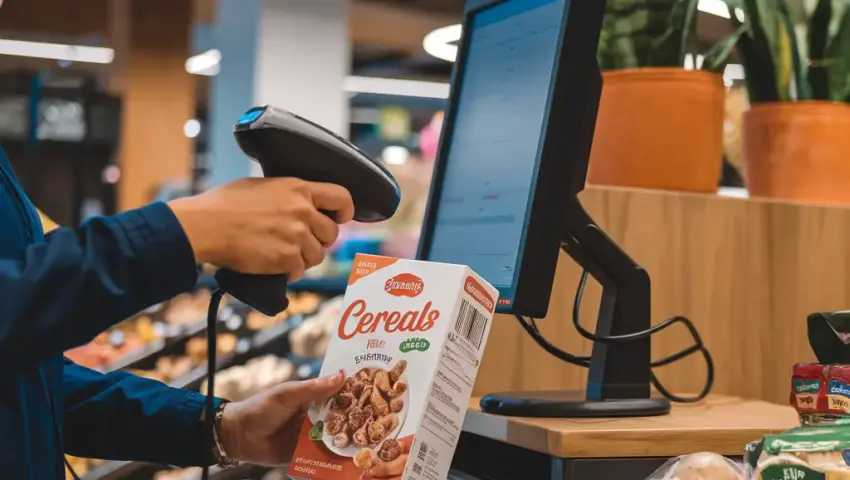
Features of Retail Management Software and Their Benefits to Supermarket Operations
Retail Management Software offers a wide array of features that are crucial for streamlining supermarket operations. From efficient checkout processes and inventory management to personalized customer engagement and robust analytics, RMS enhances both operational efficiency and customer satisfaction.
Retail Management Software (RMS) is a comprehensive solution designed to streamline various aspects of retail operations. For supermarkets, RMS can significantly enhance efficiency by automating key processes such as inventory management, point of sale (POS) operations, customer relationship management (CRM), and employee scheduling.
Here’s a look at the core features of retail management software and their specific benefits to supermarket operations.
1. Point of Sale (POS) System
Feature: The POS system is the core component of retail management software. It handles sales transactions, processes payments, prints receipts, and updates inventory in real-time. Modern POS systems also support multiple payment methods, including cash, credit/debit cards, and mobile payments.
Benefit to Business:
- Efficient Checkout Process: By automating sales transactions, POS systems speed up the checkout process, reducing wait times and improving the customer experience.
- Accurate Sales Tracking: Real-time sales data helps managers monitor sales performance, identify top-selling items, and make informed decisions about stock replenishment.
- Enhanced Payment Security: Integrated payment gateways ensure secure transactions, reducing the risk of fraud.
Case Scenario: During the evening rush hour at a busy supermarket, the POS system efficiently processes a large volume of transactions, accepting payments through various methods like credit cards, mobile wallets, and gift cards. The system’s speed and reliability help reduce long checkout lines, improving customer satisfaction.
2. Inventory Management
Feature: Retail management software includes inventory management tools that track stock levels in real-time, monitor product movements, and manage reordering. It provides features like automated stock replenishment, barcode scanning, and alerts for low stock levels.
Benefit to Business:
- Reduced Stockouts and Overstocking: By monitoring inventory in real-time, the system helps ensure that popular items are always in stock, preventing lost sales, while also avoiding overstocking of slow-moving products.
- Improved Inventory Accuracy: Barcode scanning and automated tracking reduce manual errors, ensuring accurate inventory records.
- Optimized Stock Replenishment: The software’s demand forecasting and reorder alerts help managers plan stock replenishment effectively, reducing waste and carrying costs.
Case Scenario: A supermarket notices that their most popular brand of milk often runs out by late afternoon. Using RMS, the store manager sets up automated reorder alerts for this product when stock levels fall below a certain threshold. This ensures timely restocking, reducing the risk of stockouts and lost sales.
3. Customer Relationship Management (CRM)
Feature: The CRM module in retail management software helps supermarkets manage customer data, track purchase history, and create personalized marketing campaigns. It includes features like loyalty programs, customer segmentation, and targeted promotions.
Benefit to Business:
- Increased Customer Loyalty: By offering loyalty programs and personalized promotions, supermarkets can increase repeat purchases and build long-term customer relationships.
- Enhanced Customer Insights: Analyzing purchase data helps identify customer preferences, enabling the supermarket to tailor its product offerings and marketing efforts.
- Boosted Sales through Targeted Promotions: CRM allows for targeted promotions based on customer buying patterns, leading to higher sales and better customer engagement.
Case Scenario: A supermarket uses its CRM system to analyze customer purchase data and identifies a group of regular shoppers who frequently buy organic products. The store then sends personalized discounts on organic items to this customer segment via email, boosting sales of these products and enhancing customer satisfaction.
4. Employee Scheduling and Time Management
Feature: Retail management software includes tools for employee scheduling, time tracking, and attendance management. It helps managers create shift schedules, track working hours, and monitor employee performance.
Benefit to Business:
- Optimized Staffing Levels: By analyzing peak shopping times, the software helps managers schedule more staff during busy periods, ensuring that the supermarket runs smoothly and efficiently.
- Reduced Labor Costs: Efficient scheduling minimizes overtime and reduces unnecessary labor costs, helping to maximize profitability.
- Improved Employee Satisfaction: Clear and consistent scheduling helps employees plan their work-life balance better, reducing absenteeism and turnover.
Case Scenario: The supermarket manager uses RMS to create shift schedules for cashiers and stock clerks based on historical sales data. The system predicts higher customer traffic on weekends and schedules additional staff for these peak times, ensuring that checkout lines are short and shelves are fully stocked.
5. Pricing and Promotion Management
Feature: Retail management software allows supermarkets to manage pricing strategies and promotions across all products and locations. It includes features like dynamic pricing, discount management, and promotional planning.
Benefit to Business:
- Flexible Pricing Strategies: The software enables dynamic pricing based on demand, seasonality, and competitor prices, helping supermarkets stay competitive and maximize profits.
- Effective Promotion Execution: By setting up and tracking promotions through the software, supermarkets can measure the effectiveness of sales campaigns and adjust strategies accordingly.
- Increased Sales: Well-planned promotions and discounts encourage customers to make additional purchases, boosting overall sales.
Case Scenario: The supermarket plans a weekend promotion for fresh produce. Using RMS, the manager sets up discounts on selected fruits and vegetables. The software automatically updates prices at checkout, ensuring customers receive the advertised discounts, and tracks the promotion’s impact on sales.
6. Reporting and Analytics
Feature: Retail management software provides detailed reports and analytics on various aspects of supermarket operations, including sales, inventory, customer behavior, and employee performance. It offers real-time insights and customizable dashboards for managers.
Benefit to Business:
- Data-Driven Decision Making: Real-time analytics help managers make informed decisions about product ordering, pricing, and staffing based on current performance data.
- Improved Sales Performance: By analyzing sales data, supermarkets can identify trends, top-selling products, and underperforming items, allowing for better inventory planning and product placement.
- Enhanced Operational Efficiency: Reports on employee performance, sales, and customer traffic help managers identify areas for improvement and optimize operations.
Case Scenario: The supermarket’s sales report reveals that snacks and beverages have higher sales during evening hours. Using this insight, the manager rearranges product displays to place popular snacks near the checkout area, increasing impulse purchases and boosting overall sales.
7. Supplier and Purchase Order Management
Feature: Retail management software includes features for managing supplier relationships, creating purchase orders, and tracking deliveries. It streamlines the procurement process and helps ensure that products are delivered on time.
Benefit to Business:
- Efficient Ordering Process: Automated purchase orders reduce manual effort and streamline the procurement process, saving time for managers.
- Improved Supplier Relationships: The software helps track supplier performance, ensuring timely deliveries and better negotiation of terms.
- Reduced Stock Shortages: By effectively managing orders and deliveries, the software helps maintain optimal stock levels, reducing the risk of stock shortages.
Case Scenario: The supermarket notices an increased demand for a new brand of cereal. Using RMS, the manager quickly generates a purchase order and sends it to the supplier. The software tracks the order status, ensuring timely delivery and preventing stock shortages.
8. Omnichannel Integration
Feature: Modern retail management software supports omnichannel integration, allowing supermarkets to manage both in-store and online sales from a single platform. It integrates inventory, customer data, and sales across various channels, providing a seamless experience for customers.
Benefit to Business:
- Expanded Customer Reach: By offering both in-store and online shopping options, supermarkets can cater to a wider range of customers, increasing sales opportunities.
- Unified Inventory Management: The software syncs inventory across all channels, preventing issues like overselling and stock discrepancies.
- Consistent Customer Experience: Customers enjoy a seamless shopping experience, whether they buy products in-store, online, or through a mobile app.
Case Scenario: A customer places an online order for grocery pickup. The RMS automatically updates the inventory, prepares the order for pickup, and sends a notification to the customer when it’s ready. This integration enhances convenience for the customer and helps the supermarket manage its inventory effectively.
Conclusion
Retail Management Software offers a wide array of features that are crucial for streamlining supermarket operations. From efficient checkout processes and inventory management to personalized customer engagement and robust analytics, RMS enhances both operational efficiency and customer satisfaction. By automating routine tasks and providing real-time insights, RMS enables supermarkets to focus on delivering a superior shopping experience, driving sales, and optimizing overall performance. Adopting a comprehensive RMS is an essential step for supermarkets looking to stay competitive and meet the evolving demands of the retail industry
Timo Kavuma
Leave a comment
Your email address will not be published. Required fields are marked *


